Marija Laban-Lazović1, Marko Zečević2,3, Nikola Kotur2, Vladimir Gašić2, Bojan Ristivojević2, Vesna Skodrić-Trifunović1,4, Tatjana Adžić-Vukičević1,4, Branka Zukić2, Sonja Pavlović2, Biljana Stanković2*
1 Clinic of Pulmonology, University Clinical Centre of Serbia, Belgrade, Serbia
2 Institute of Molecular Genetics and Genetic Engineering, University of Belgrade, Serbia
3 Velsera, Belgrade, Serbia
4 Faculty of Medicine, University of Belgrade, Serbia
biljana.stankovic [at] imgge.bg.ac.rs
Abstract
Long COVID-19 is characterized by symptoms that persist for more than three months after the acute phase of a SARS-CoV-2 infection. It can affect individuals who had both severe and mild cases of COVID-19. The genetic predisposition to this condition remains largely unexplored.
This study aimed to identify genomic loci associated with Long COVID-19. The study included 92 patients with confirmed infection with SARS-CoV-2 during the delta variant wave and treated in hospital settings. These patients were monitored for up to six months after the acute infection.
All patients were genotyped using the Illumina Infinium global screening array, which covers over 700,000 genomic variants. Imputation was employed to expand the number of variants to 12,001,939 using the 1kGP Phase 3 human reference panels. We conducted a genome-wide association analysis using an in-house built pipeline on the Cancer Genomic Cloud platform.
Our results identified association signals in the 20p11.21 genomic locus, with the lead variant being rs1275745396 (p = 6.181×10-8), located within cystatin genes (CST3, CST4, CST1). The cystatin family consists of cysteine protease inhibitors, involved in various physiological processes. Previous literature has linked serum and saliva cystatin levels to COVID-19 severity and outcomes. Moreover, cystatin’s role in taste perception has been recognized previously, which is in line with the well-known perturbations in sensory perception caused by COVID-19. This study is the first to find a genetic association between cystatin genes and Long COVID-19.
Further research is necessary to elucidate the role of the cystatin protein family and the biological processes underlying Long COVID-19. A deeper understanding of Long COVID-19 can inform the development of preventive and therapeutic strategies.
Keywords: GWAS, Long COVID-19, cystatins
Acknowledgment: This work was supported by the Ministry of Education, Science and Technological Development, Republic of Serbia (Grant No 451-03-66/2024-03/200042). Computational resources were provided by The Cancer Genomics Cloud, powered by Seven Bridges, a component of the NCI Cancer Research Data Commons (datacommons.cancer.gov), funded in whole or in part with Federal funds from the National Cancer Institute, National Institutes of Health, Department of Health and Human Services, under Contract No. HHSN261201400008C and ID/IQ Agreement No. 17X146 under Contract No. HHSN261201500003I and 75N91019D00024.

